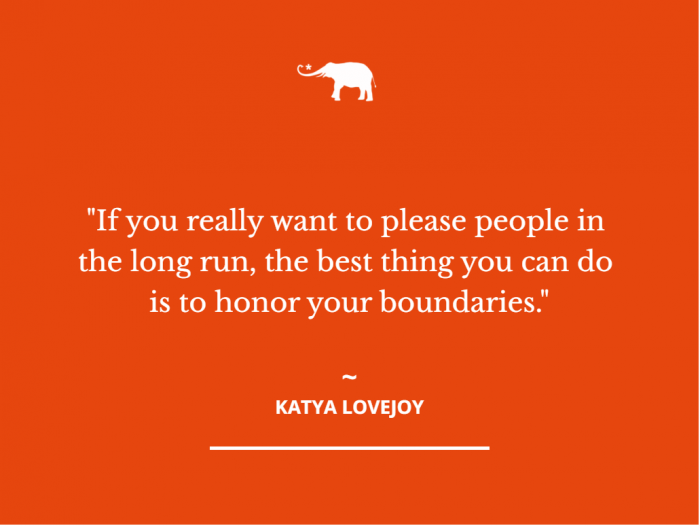View this post on Instagram
When I was 23, I started dating a woman I was really excited about.
She was beautiful, charismatic, successful, and passionate.
When we spent time together, we could laugh and have fun as well as connect on deeper levels. We just “clicked.”
About a month into dating, I invited her to my birthday party. She said She’d be there and was looking forward to celebrating me and meeting my friends. I gushed to my friends and told them to get ready to meet this amazing man. Even though my birthday was exciting enough on its own, I felt an extra electricity that night knowing that my new woman would be there.
At the party, my friends were excited to meet her too. But as the hours passed by and she still didn’t show up, I felt a heaviness sinking in my stomach. I didn’t understand. She had specifically said she’d be there. Soon I got a text from her saying she couldn’t make it. I was heartbroken.
In our conversations after the fact, she shared that she had said yes to too many events that night. She admitted that this was a habit of hers, to say yes to people because she didn’t want to disappoint them. She would say yes even when she knew she wasn’t going to be able to follow through on her commitments.
She shared that she was newly in recovery from alcoholism and was deep in the process of confronting how her habits hurt and disappointed both herself and others. We ended things at that point so she could focus on her healing and I could date other people who respected me and my time. Years later, after being sober for a long time, she reached out to me and apologized for hurting me.
That’s the thing: people-pleasing hurts.
It starts off with a good intention, but ultimately it’s destructive and selfish. Because the act of people-pleasing is less about the person you are trying to accommodate and more about trying to avoid pain and responsibility.
When we say yes to something that we know is a no, we do so because it feels too scary to sit with the other person’s disappointment or with our own feelings of vulnerability. This behavior is a misguided way of trying to protect ourselves.
Perhaps as children, we learned that if we didn’t do what our caregivers wanted, we would be hurt or abandoned. Maybe we learned that our needs don’t matter and that we must always put them aside in order to caretake another. This is how we try to protect and rescue both ourselves and others. We stuff down our own truth in order to rescue the other person (and mostly ourselves) from their disappointment.
Ultimately, this technique backfires because no one’s needs are getting met. When we attempt to rescue another person from their emotions, we are basically saying to them, “I don’t believe you are strong enough to handle your emotions, and I also don’t trust your integrity to still be in this relationship if I don’t do this.” This keeps us bound in a codependent dynamic, which leads to drama, pain, and feeling powerless.
If you really want to please people in the long run, the best thing you can do is to honor your boundaries.
When we’re saying yes to things that we know are a no, we are lacking boundaries around our own truth. Relationships without boundaries are bound to lead to disappointment and resentment.
It’s a relief to be in a relationship with someone who has strong boundaries because we know where we stand with them. Even if they can’t do something we want of them, there’s a sense of security we feel around these people because we can feel how grounded and solid they are with themselves. When we watch them not abandon themselves, we can have more faith that they won’t abandon us either.
So if you’re ready to stop your people-pleasing habit, there are a few things you can do:
1. Get clear on your true yes and your true no.
Before responding to someone’s request, take some time to feel into what’s true for you. You can ask yourself, “If I say yes to this, how am I going to feel?” Play the tape forward—you know if you’ll want to and be able to follow through. Stay in integrity with your truth and you protect both you and the other person from the damaging effects of people-pleasing.
2. Uncover the roots of your people-pleasing behavior.
As mentioned, this behavior is usually developed within our primary relationships growing up. The relationship dynamics we learned from our caregivers become the template for how we behave as adults. Most of this programming lies in the subconscious mind, so practices like hypnosis and meditation can not only help us get clear on the origins of patterns, but also change them at the source.
3. Take some time to understand codependent dynamics.
Codependency feels like a taboo word these days that people don’t want to admit to, but the reality is that many people are operating in relational dynamics that have elements of insecurity and power struggle, and this is what underlies codependency. It’s important to note that the opposite of codependency is not independence. Our goal in relationships is to be interdependent, where each person comes from a place of knowing and honoring themselves and choosing to co-create with another person.
~
~











Read 1 comment and reply